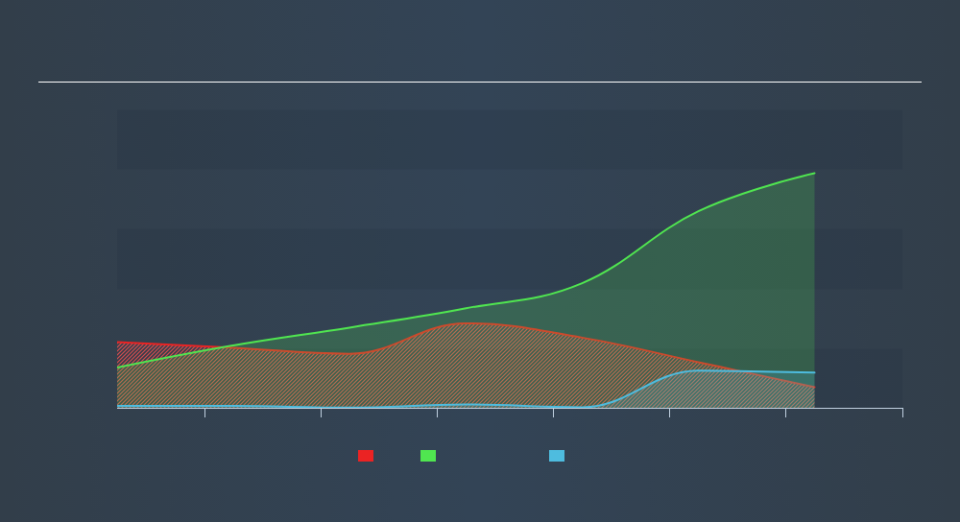Does Worth Peripherals (NSE:WORTH) Have A Healthy Balance Sheet?

Warren Buffett famously said, 'Volatility is far from synonymous with risk.' So it seems the smart money knows that debt - which is usually involved in bankruptcies - is a very important factor, when you assess how risky a company is. Importantly, Worth Peripherals Limited (NSE:WORTH) does carry debt. But should shareholders be worried about its use of debt?
Why Does Debt Bring Risk?
Generally speaking, debt only becomes a real problem when a company can't easily pay it off, either by raising capital or with its own cash flow. In the worst case scenario, a company can go bankrupt if it cannot pay its creditors. However, a more common (but still painful) scenario is that it has to raise new equity capital at a low price, thus permanently diluting shareholders. Of course, the upside of debt is that it often represents cheap capital, especially when it replaces dilution in a company with the ability to reinvest at high rates of return. When we examine debt levels, we first consider both cash and debt levels, together.
View our latest analysis for Worth Peripherals
How Much Debt Does Worth Peripherals Carry?
The image below, which you can click on for greater detail, shows that Worth Peripherals had debt of ₹69.0m at the end of March 2019, a reduction from ₹152.9m over a year. However, it does have ₹117.8m in cash offsetting this, leading to net cash of ₹48.8m.
How Strong Is Worth Peripherals's Balance Sheet?
Zooming in on the latest balance sheet data, we can see that Worth Peripherals had liabilities of ₹130.8m due within 12 months and liabilities of ₹109.4m due beyond that. Offsetting this, it had ₹117.8m in cash and ₹205.4m in receivables that were due within 12 months. So it actually has ₹83.0m more liquid assets than total liabilities.
This short term liquidity is a sign that Worth Peripherals could probably pay off its debt with ease, as its balance sheet is far from stretched. Simply put, the fact that Worth Peripherals has more cash than debt is arguably a good indication that it can manage its debt safely.
But the other side of the story is that Worth Peripherals saw its EBIT decline by 2.8% over the last year. That sort of decline, if sustained, will obviously make debt harder to handle. When analysing debt levels, the balance sheet is the obvious place to start. But you can't view debt in total isolation; since Worth Peripherals will need earnings to service that debt. So when considering debt, it's definitely worth looking at the earnings trend. Click here for an interactive snapshot.
But our final consideration is also important, because a company cannot pay debt with paper profits; it needs cold hard cash. While Worth Peripherals has net cash on its balance sheet, it's still worth taking a look at its ability to convert earnings before interest and tax (EBIT) to free cash flow, to help us understand how quickly it is building (or eroding) that cash balance. Looking at the most recent three years, Worth Peripherals recorded free cash flow of 27% of its EBIT, which is weaker than we'd expect. That's not great, when it comes to paying down debt.
Summing up
While we empathize with investors who find debt concerning, you should keep in mind that Worth Peripherals has net cash of ₹49m, as well as more liquid assets than liabilities. So we don't have any problem with Worth Peripherals's use of debt. Of course, we wouldn't say no to the extra confidence that we'd gain if we knew that Worth Peripherals insiders have been buying shares: if you're on the same wavelength, you can find out if insiders are buying by clicking this link.
At the end of the day, it's often better to focus on companies that are free from net debt. You can access our special list of such companies (all with a track record of profit growth). It's free.
We aim to bring you long-term focused research analysis driven by fundamental data. Note that our analysis may not factor in the latest price-sensitive company announcements or qualitative material.
If you spot an error that warrants correction, please contact the editor at editorial-team@simplywallst.com. This article by Simply Wall St is general in nature. It does not constitute a recommendation to buy or sell any stock, and does not take account of your objectives, or your financial situation. Simply Wall St has no position in the stocks mentioned. Thank you for reading.

